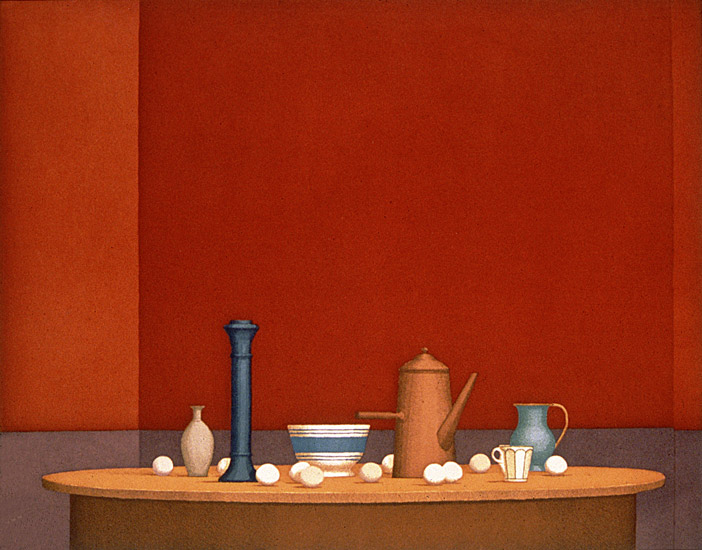“Ignorance never settles a question.”
Benjamin Disraeli, speech in the House of Commons (May 14, 1866)
Terry Teachout on the arts in New York City
“Ignorance never settles a question.”
Benjamin Disraeli, speech in the House of Commons (May 14, 1866)

I was entranced by William Bailey’s recent exhibition of paintings and works on paper at Robert Miller Gallery. Bailey is known for his luminous, exactly rendered still lifes, in which assorted jars, bowls, pitchers and eggs are placed on a table top in an infinite variety of subtly different arrangements. Usually the objects are painted head-on in a shallow space, but once in a while Bailey varies this formula, as in “Monte Rotondo,” in which they are placed in a corner and shown from above, and the effect resembles that of a thunderclap in a quiet room. People who don’t get Bailey really don’t get him, and I used to be one of them—I thought he was a slick American knockoff of Giorgio Morandi—but this show opened my eyes. Now I recognize him for the modern master he most certainly is. In the Church of Art, there is always room for adult converts.

As I once remarked about the experience of listening to the music of Gabriel Fauré, “it is as though you were talking with a shy person whose voice is only audible in a quiet room. If the room is too noisy—or if you insist on doing all the talking—then you will hear nothing at all.” But for all the noise in the crowded, clamorous room that is postmodern American art, there are still plenty of people who are capable of “hearing” and understanding what Bailey has to say…and marveling that such eloquent statements continue to be made at a time when there are (in his rueful words) “fewer and fewer people who can see painting.” Yet the paintings are there in abundance, waiting patiently to be seen.
I met Bailey on opening night and, sure enough, I was struck by his modesty and quiet sweetness. I suppose he knew exactly how good he was, but you would never have guessed it from his manner. Though our paths never crossed again, I have never forgotten our sole encounter, of which I am reminded each time I go into the kitchen and look, sometimes casually but more often with close, loving attention, at Piazza Rotonda.
* * *
The New York Times‘ obituary is here.Kim Stanley, Geraldine Page, and Sandy Dennis co-star in a 1966 Actors Studio film version of Anton Chekhov’s Three Sisters directed by Paul Bogart:
(This is the latest in a series of arts- and history-related videos that appear in this space each Monday, Wednesday, and Friday)
“Among those whom I like or admire, I can find no common denominator, but among those whom I love, I can: all of them make me laugh.”
W.H. Auden, “Notes on the Comic”
* * *
When I first started covering regional theater 16 years ago, I was astonished to discover that what I then called “Broadway-quality shows” could be seen in every corner of the country. That condescending phrase, though, proved inadequate, since most of the shows I saw on the road were at least as good as—or better then—anything on Broadway. Moreover, the vast majority of America’s large- and medium-sized cities are home to at least one high-quality theater company…

Among the finest of them is Fort Myers’ Florida Repertory Theatre. Located in a city better known for its beaches, Florida Rep is noteworthy for its beautifully proportioned 393-seat Arcade Theatre, a former vaudeville house built in 1915 and converted into a legitimate proscenium-stage theater after a stretch as a downtown movie house, and its semi-permanent ensemble of actors, directors, designers and stage managers, all of whom know each other’s work so well that the company’s shows have a single-minded artistic unanimity you never see on Broadway.
“A Doll’s House, Part 2,” Florida Rep’s last scheduled show before being shuttered by the virus, was a production of Lucas Hnath’s 2017 sequel to Henrik Ibsen’s bourgeois-baiting 1879 play in which Nora Helmer, an emotionally unfulfilled mother of three, walks out on her family to seek a more abundant life, slamming the front door behind her as she departs. In Mr. Hnath’s play, she comes home 15 years later to settle scores with her husband, having since written a best-selling memoir about what a jerk he was….
Florida Rep’s revival makes a potent and, in my case, surprising case for the sheer theatrical effectiveness of “A Doll’s House, Part 2,” which Chris Clavelli has wisely staged less as a Major Political Statement than as a domestic comedy with feminist overtones. The four performances are broader in tone than those of their Broadway counterparts, always to good effect…
* * *
Read the whole thing here.The trailer for A Doll’s House, Part 2:
Liberace plays excerpts from the first movement of Tchaikovsky’s First Piano Concerto. This performance is drawn from Sincerely Yours, a 1955 feature film directed by Gordon Douglas and starring the pianist:
(This is the latest in a series of arts- and history-related videos that appear in this space each Monday, Wednesday, and Friday)
“Young people, who are still uncertain of their identity, often try on a succession of masks in the hope of finding the one which suits them—the one, in fact, which is not a mask.”
W.H. Auden, “One of the Family”
“Self-trust is the essence of heroism.”
Ralph Waldo Emerson, “Heroism”
An ArtsJournal Blog